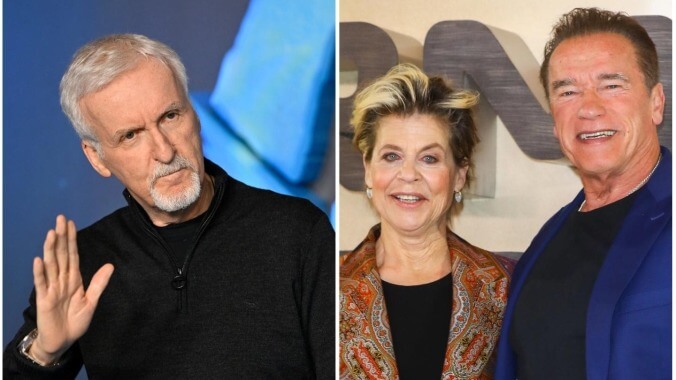James Cameron owns up to the issues with Terminator: Dark Fate
James Cameron admits his team got "high on our own supply" while making 2019's Terminator: Dark Fate

James Cameron is known for many things, one of them being his impervious confidence in his own abilities as a filmmaker. Look no further than the current Avatar: The Way Of Water press tour for examples. Yet Cameron’s not blind to reality, and he’s willing to accept a setback if it comes—already, he sketches for Deadline possible outcomes for the Avatar series if the second installment doesn’t do as well as he thinks. (“But I don’t like to think in terms of failure, I like to think in terms of success.”)
Such was the case for Terminator: Dark Fate, a film that Cameron did not direct but produced and collaborated on the story. Speaking with the outlet, Cameron says he’s “actually reasonably happy with the film,” but he’s willing to take some responsibility for the notorious box office bomb. The issue, as he sees it, is he’s just too darn loyal.
“I think the problem, and I’m going to wear this one, is that I refused to do it without Arnold [Schwarzenegger],” he explains. “[Director] Tim [Miller] didn’t want Arnold, but I said, ‘Look, I don’t want that. Arnold and I have been friends for 40 years, and I could hear it, and it would go like this: ‘Jim, I can’t believe you’re making a Terminator movie without me.’’ It just didn’t mean that much to me to do it, but I said, ‘If you guys could see your way clear to bringing Arnold back and then, you know, I’d be happy to be involved.’”
He continues, “And then Tim wanted Linda. I think what happened is I think the movie could have survived having Linda in it, I think it could have survived having Arnold in it, but when you put Linda and Arnold in it and then, you know, she’s 60-something, he’s 70-something, all of a sudden it wasn’t your Terminator movie, it wasn’t even your dad’s Terminator movie, it was your granddad’s Terminator movie.”
So the real villain was ageism all along, huh? For the record, “We loved it, we thought it was cool, you know, that we were making this sort of direct sequel to a movie that came out in 1991,” Cameron says. “And young moviegoing audiences weren’t born. They wouldn’t even have been born for another 10 years.” That’s the kind of timey-wimey explanation that should pair perfectly with the Terminator series, but unfortunately, it doesn’t work that way in real life.
Instead, “it was just our own myopia,” in Cameron’s opinion. “We kind of got a little high on our own supply, and I think that’s the lesson there.” Luckily, there’s no chance of getting high on the Avatar supply. Right? Right?